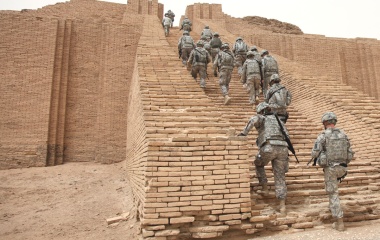
“And Noach begot three children, Shem, Cham and Yefet” (Breisheet 6:9). Unlike the many other brothers we meet in Breisheet, there is no tension amongst Noach’s sons. They may have little to do with each other - rather strikingly the Bible records nary a word of theirs – but at least they did not fight. That is much more than we can say about the children of Avraham, Yitzchak and Yaakov.
Their silence[1] is something they presumably learned from their father, whose first words – at least in the Bible – are recorded only after the flood[2]. The only words we hear from Noach is, after waking up from his “hangover”, and realizing what has been done to him by Cham, the curse he gives him and contrasts him with Shem and Yefet[3].
It surely is not coincidental that Adam and Noach, both had three children. Sadly, Hevel never had a chance to marry and Cain’s line ended with the flood. Only the line of Shet survived and only one of his many, many descendants was not wiped out in the flood. Noach’s three children would be the ones to populate the world, the progenitors of the “70 nations” – each in a very different way.
It seems unlikely that Noach actually named his children Shem, Cham and Yefet or Name, Heat and Beauty. Rather they are prototypes. Cham, heat is the one who gives into temptations, a sinner especially in the sexual realm. It was he who apparently castrated his father while he was sleeping. His children include Cannan and Mitzraim. No wonder the Torah introduces its laws of sexual ethics (Vayikra 18, read on Yom Kippur afternoon) admonishing us not to follow in the ways of the Egyptians and Canaanites.
Yefet, beauty, begets Yavan, the forerunner of Greece with its emphasis on beauty, aesthetics and worldly wisdom. Yefet is to “dwell in the tents of Shem, Name” (Breisheet 9:27) the ancestor of Avraham, the who called on the name of G-d, founding the Jewish nation. While Yefet and Shem can enrich each other, Cham is to be rejected.
The Torah is rather ambiguous as to whether it is Shem or Yefet who is older (Breishhet 10:21)[4] a point debated by our Sages. Yet does it really matter if it was Shem or Yefet who was older? I think not. However, whether we should focus first on Shem’s legacy or Yefet’s is a different matter.
There is little doubt that it is calling out G-d’s name, of being the nation blessed to call on G-d’s name through observance of the Torah is more significant than being the nation that brought so much wisdom to the world. Yet at the same time, derech eretz kadma letorah, the ways of the world must precede Torah. Torah without wisdom, without proper form, risks distorting Torah and turning people away from Torah.
Our Sages in a striking observation note that, “A Torah scholar who lacks wisdom, a carcass is better than he” (Vayikra Rabba 1:15) Shem must welcome Yefet into his tent and if he does not he risks not only beauty but also Torah. Yafeh, beautiful is Torah with derech eretz (Pirkei Avot 2:2).
[1] They are speechless, though at least we know who they are. As to their wives – a full 50% of the those saved in the ark – we do not even know their names.
[2] Presumably he was too traumatized to speak. He could not even leave the ark when the flood ended and only did so after G-d’s command to leave.
[3] There is in fact very little speech in the first 20 generations of mankind and that which we have is not very positive. The discussion between the snake and Eve, Adam’s evading or responsibility for his sin, Cain speaking to his brother Hevel, Lemech bragging to his wives that he was a murderer. It’s as if the misuse of speech led G-d to silence mankind – an especially appropriate punishment if one assumes that our Divine image is manifest in man’s ability to speak.
Perhaps the first positive use of speech is when those building the Tower of Bavel “said to one another” (Breisheet 11:3) let’s build a city something our Sages well understood. In explaining why the generation of the flood had to be destroyed whereas that of the Tower was only dispersed, they noted that this generation was united – even if that unity, claim our Sages, was to challenge G-d i.e. a form of idolatry
[4] “Sons were also born to Shem, ancestor of all the descendants of Eber achi Yefet hagadol”(Breisheet 10:21). It is unclear whether it is Yefet who is the gadol, the oldest or the achi hagadol refers back to the beginning of the verse, that it is Shem who is the oldest, putting a comma between Yefet and gadol.



